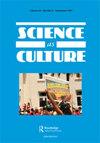Big Tech
IF 2.4
3区 哲学
Q1 CULTURAL STUDIES
引用次数: 22
Abstract
Big Tech is in the public and political spotlight. Usually defined as Apple, Amazon, Microsoft, Google/Alphabet, and Facebook/Meta, Big Tech is becoming the watchword for corporate surveillance, monopoly, and market power. Arguably, they are the defining institutions of our day, dominating our political economies, societies, and polities as Big Oil or Big Banks did in their time. Criticism of Big Tech is increasingly evident as well, cutting across popular books, academic work, film, and journalism: examples include, Shoshana Zuboff’s (2019) book The Age of Surveillance Capitalism; recent documentaries like Social Dilemma and Agents of Chaos; and regular column inches in print media like the Financial Times and The Economist, this being particularly notable as these two are intellectual bastions of capitalism. As public, political, and policy backlash against the activities of Big Tech followed results of the 2016 US Presidential Election, the 2016 British Referendum on Europe, and the 2018 revelations about Cambridge Analytica (Zuboff, 2019), commentators have highlighted the significant loss of trust in these digital technology companies and their wares – dubbed the ‘techlash’ (Foroohar, 2019). This techlash is hardly surprising since, as Prainsack (2019) points out, Big Tech firms increasingly underpin much of our social, political, and economic worlds by providing the digital infrastructure on which we rely to live our lives. Consequently, governments and others around the world are increasingly turning their regulatory gaze onto Big Tech, leading to a surge in policy and legislative measures to curb their social and market power. Big Tech has been the subject of critical political investigations, like the recent US Congressional Hearings on Online Platforms and Market Power, or the International Grand Committee on Big Data, Privacy and Democracy. Big Tech has also been the target of specific policy action, like the European Union’s (EU) recently passed Digital Markets Act (DMA), which seeks to address the大型科技股
大型科技公司是公众和政界关注的焦点。通常被定义为苹果、亚马逊、微软、bb0 /Alphabet和Facebook/Meta,大科技正在成为企业监控、垄断和市场力量的代名词。可以说,它们是我们这个时代的决定性机构,主宰着我们的政治经济、社会和政治,就像大石油公司或大银行在他们那个时代所做的那样。对大型科技公司的批评也越来越明显,包括流行书籍、学术著作、电影和新闻:例如,肖莎娜·祖博夫(Shoshana Zuboff, 2019)的《监视资本主义时代》(The Age of Surveillance Capitalism);最近的纪录片,如《社会困境》和《混乱的代理人》;以及像《金融时报》和《经济学人》这样的印刷媒体的常规专栏,这一点尤其值得注意,因为这两家媒体都是资本主义的知识堡垒。随着2016年美国总统大选、2016年英国脱欧公投以及2018年剑桥分析公司(Zuboff, 2019)的曝光,公众、政治和政策对大型科技公司活动的强烈反对,评论员们强调了对这些数字技术公司及其产品(被称为“科技冲击”)的严重丧失信任(Foroohar, 2019)。这种技术冲击并不令人惊讶,因为正如Prainsack(2019)所指出的那样,大型科技公司通过提供我们赖以生活的数字基础设施,越来越多地支撑着我们的社会、政治和经济世界。因此,世界各地的政府和其他机构正越来越多地将监管目光转向大型科技公司,导致遏制它们的社会和市场力量的政策和立法措施激增。大型科技公司一直是重要政治调查的对象,比如最近美国国会关于在线平台和市场力量的听证会,或者大数据、隐私和民主国际大委员会(International Grand Committee on Big Data, Privacy and Democracy)。大型科技公司也一直是具体政策行动的目标,比如欧盟(EU)最近通过了《数字市场法案》(DMA),该法案旨在解决互联网行业面临的问题
本文章由计算机程序翻译,如有差异,请以英文原文为准。
求助全文
约1分钟内获得全文
求助全文
来源期刊

Science As Culture
Multiple-
CiteScore
5.20
自引率
3.80%
发文量
28
期刊介绍:
Our culture is a scientific one, defining what is natural and what is rational. Its values can be seen in what are sought out as facts and made as artefacts, what are designed as processes and products, and what are forged as weapons and filmed as wonders. In our daily experience, power is exercised through expertise, e.g. in science, technology and medicine. Science as Culture explores how all these shape the values which contend for influence over the wider society. Science mediates our cultural experience. It increasingly defines what it is to be a person, through genetics, medicine and information technology. Its values get embodied and naturalized in concepts, techniques, research priorities, gadgets and advertising. Many films, artworks and novels express popular concerns about these developments. In a society where icons of progress are drawn from science, technology and medicine, they are either celebrated or demonised. Often their progress is feared as ’unnatural’, while their critics are labelled ’irrational’. Public concerns are rebuffed by ostensibly value-neutral experts and positivist polemics. Yet the culture of science is open to study like any other culture. Cultural studies analyses the role of expertise throughout society. Many journals address the history, philosophy and social studies of science, its popularisation, and the public understanding of society.
 求助内容:
求助内容: 应助结果提醒方式:
应助结果提醒方式:


